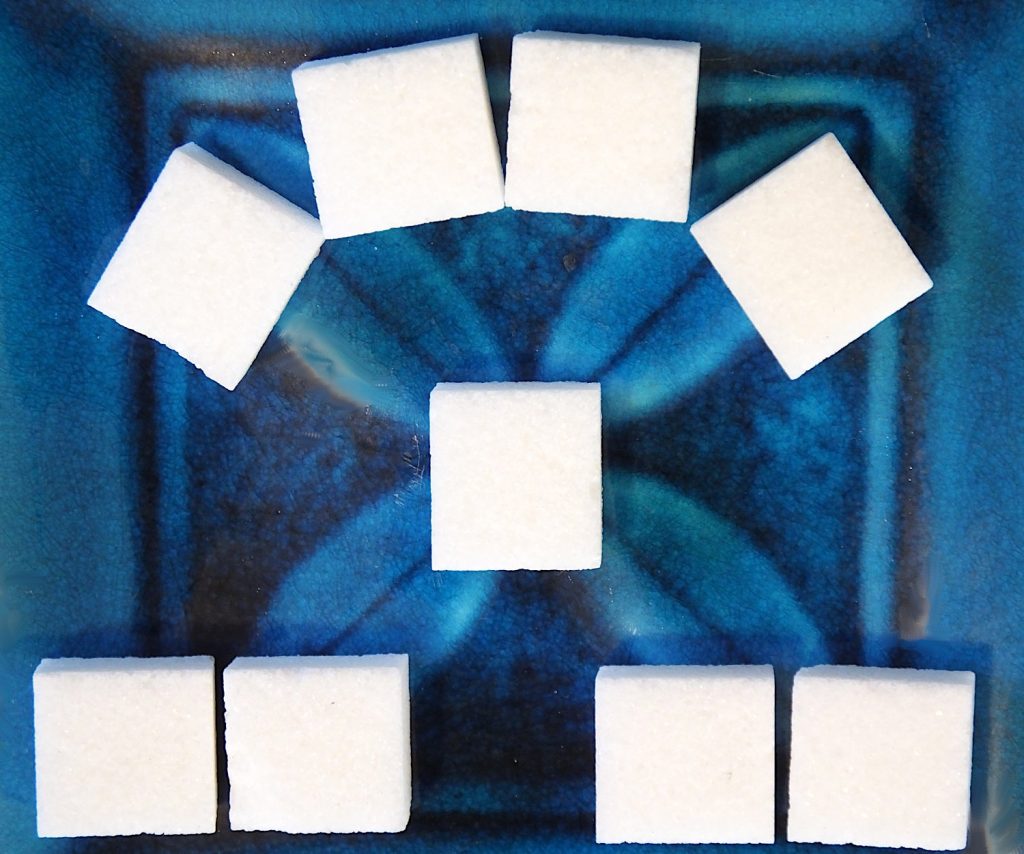Sugar and the “A” Word

Apparently, there is still debate about whether sugar should be considered an addictive substance. Maybe it is just a substance that happens to lead people to the behavioral addiction of eating — not the mob boss, but only one of the enforcer goons.
The food industry is very obliging about giving the public what it wants, some of which is “food” made totally or mostly of sugar. The carnival treat known as cotton candy or spun sugar is, not surprisingly, 100% sugar. Festive red-and-white striped Yuletide canes, and all other hard candies, are some combination of “sucrose, fructose, glucose, or maltose syrups,” heated to 160 degrees centigrade and then molded before cooling into solidity.
Marshmallows and licorice are mainly sugar. Soda pop is sugar plus water. Summer treats on wooden sticks are sugar plus water, frozen.
Dextrose is one of the four most common intravenous solutions administered to hospital patients, so some of the sickest people in the world are alive thanks to mainlining sugar. But for the healthy person, there is no excuse. Nevertheless, people will drink maple syrup or chocolate ice cream sauce straight from the bottle. Ready-made cake frosting is just sugar with a creamy texture, but an allegedly sane human will fetch a spoon and eat it straight from the can.
“No one cares how much you know until they know how much you care,” is the motto of personal trainer Drew Manning, who noticed that many of his followers and potential clients held the belief that they were made of different stuff — that no matter what, they would never have the potential to become as fit as he was.
Manning intentionally gained more than 60 pounds, so that on the way back down he and his clients would all be on the same level, sharing the exact same experiences step by step. He said at the time,
To some extent, all of these foods that I’m eating (sugary cereals, granola bars, juices, white breads, white pastas, sodas, crackers, chips, frozen dinners, mac n cheese, etc.) taste delicious. But then I feel like crap later on and I get hungry again and crave those same foods… I definitely feel ‘addicted’ to these foods. In the beginning, I did not like soda, but now I can’t go a day without, otherwise I’ll get the headaches, bad mood, etc.
Among the foods he named, a person might be surprised to learn how many contain some form of sugar. (Is this like nitrogen and oxygen, in connection with air? Without one or both, it’s just not air. Are we approaching the point where every food has to contain sugar?)
At any rate, for those interested, Drew Manning’s entire story with plenty of video is out there at fit2fat2fit.com/.
A fascinating website by Alexander Heyne offers photos of popular breakfast cereals and many, many other commercial foodstuffs. The recommended serving is shown next to the equivalent number of sugar cubes which, it must be said, makes for a pretty impressive visual aid. Then, it gets really good, with a section titled “How Much Sugar is in Random Things It Shouldn’t Be In?” Tomato sauce, snack crackers, bacon… Curious people who crack that door open and peek through it might be in for quite a shock.
Maybe the strongest argument against sugar’s addictiveness is that if it were addictive, 100% of the population would be hooked on it. But although the percentage of people who act like they are sugar-addicted is pretty high, it does not reach 100%. So, “quod erat demonstrandum.” That proves it, and it sounds more impressive in Latin. Sugar, per se, is not an addictive drug.
But something is definitely going on, as demonstrated by another interesting angle, which is what people themselves think — and an awful lot of them believe they are sugar addicts. They seek advice from Western medicine professionals and an assortment of healers from varying schools of thought and modes of practice.
Experts offer 4, 5, 7, or 8 signs by which someone can determine whether they are a sugar addict. People look to each other for help, via online forums like Reddit and Quora. They join organizations modeled after Alcoholics Anonymous. Moreover, such esteemed institutions as the Cleveland Clinic reinforce the notion by publishing informative articles like “How to Break Your Sugar Addiction.”
Dr. Pretlow says,
From a displacement theory standpoint, sugar appears to be a cue that triggers eating as a displacement behavior. This may develop into an eating addiction.
Written by Pat Hartman. First published January 19, 2024.
Sources:
“Hard Candy,” umich.edu, undated.
“Here’s How Much Sugar is Really In The Food We Eat Every Day (In Pictures),” ModernHealthMonk.com, undated.
“Why a personal trainer is making himself obese on purpose,” Yahoo.com, 10/14/11.
Image Copyright: Jacqui Brown/CC BY-SA 2.0 DEED.





1 COMMENTS